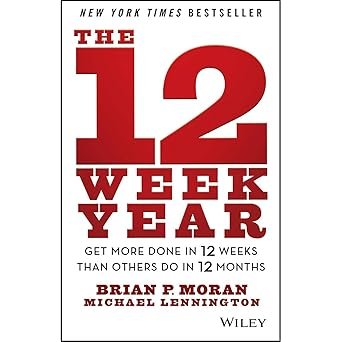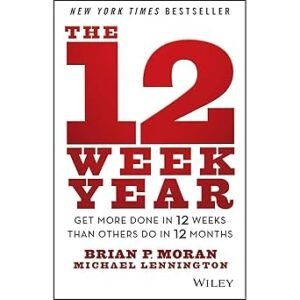
The 12 Week Year: A Comprehensive Review
Brian P. Moran’s The 12 Week Year is a productivity and goal-setting guide that challenges the traditional annual planning approach.
By breaking down the year into 12-week cycles, the book advocates for a more focused, urgent, and effective way to achieve goals.
Key Concepts and Benefits:
- Focus and Urgency: Breaking down goals into 12-week sprints creates a sense of urgency and laser-like focus. This heightened sense of time pressure can significantly boost productivity.
- Measurable Goals: The book emphasizes the importance of setting specific, measurable, achievable, relevant, and time-bound (SMART) goals. By defining clear metrics, you can track progress and make necessary adjustments.
- Accountability and Review: Regular check-ins and accountability partners are essential to staying on track. The 12-week cycle provides a structured framework for reviewing progress and making adjustments.
- Continuous Improvement: The iterative nature of the 12-week cycle encourages continuous learning and improvement. By reflecting on each cycle, you can identify areas for growth and adjust your approach for future cycles.
Strengths:
- Practical Approach: The book offers actionable strategies and templates to help you implement the 12-week year framework.
- Proven Effectiveness: Many individuals and organizations have reported significant improvements in productivity and goal achievement by adopting this approach.
- Flexible Framework: The 12-week year can be adapted to various personal and professional goals, from fitness and health to business and career development.
Potential Drawbacks:
- Short-Term Focus: While the 12-week cycle is effective for short-term goals, it may not be ideal for long-term, strategic planning.
- Potential for Overwhelm: Some individuals may find the intense focus and urgency of the 12-week cycle to be overwhelming or stressful.
Overall, The 12 Week Year is a valuable resource for anyone looking to boost their productivity and achieve their goals.
By breaking down the year into manageable chunks and focusing on what truly matters, you can make significant progress and live a more fulfilling life.
Specific Techniques and Strategies from “The 12 Week Year”
Here are some of the key techniques and strategies outlined in Brian P. Moran’s book:
Goal Setting:
- SMART Goals: Ensure your goals are Specific, Measurable, Achievable, Relevant, and Time-bound.
- Prioritization: Focus on the most important tasks and goals for each 12-week cycle.
- Visualization: Create a vivid mental image of your desired outcome to motivate yourself.
Time Management:
- Time Blocking: Allocate specific time blocks for different tasks and activities.
- Eat the Frog: Tackle the most challenging or important task first thing in the morning.
- Time Audit: Analyze how you spend your time to identify time-wasting activities.
Accountability and Review:
- Accountability Partner: Find someone to hold you accountable for your goals and progress.
- Regular Reviews: Schedule weekly and monthly reviews to assess your progress and make adjustments.
- Celebrate Wins: Recognize and reward your achievements, no matter how small.
Mindset and Habits:
- Growth Mindset: Embrace challenges and view setbacks as opportunities for learning and growth.
- Habit Stacking: Add new habits to existing routines to make them easier to establish.
- Mindful Practice: Practice mindfulness techniques to reduce stress and improve focus.
Applying the 12-Week Year Framework to a Specific Goal
Let’s say your goal is to write a 50,000-word novel in a year. Here’s how you could apply the 12-week year framework:
Cycle 1:
- Goal: Write the first draft of the novel.
- Weekly Goal: Write 4,000 words per week.
- Strategies: Set aside specific time blocks for writing, find a quiet writing space, and use a writing app to track your progress.
Cycle 2:
- Goal: Revise and edit the first draft.
- Weekly Goal: Revise and edit 5,000 words per week.
- Strategies: Use editing tools and software to identify areas for improvement, seek feedback from beta readers, and focus on one editing task at a time.
Cycle 3:
- Goal: Finalize the manuscript and prepare it for submission.
- Weekly Goal: Complete one specific task related to the finalization process, such as formatting, proofreading, or querying agents.
- Strategies: Create a detailed checklist of tasks to be completed, seek professional editing help if needed, and research potential agents or publishers.
By breaking down the year into 12-week cycles, you can maintain momentum, stay focused, and achieve your long-term goal.
Be flexible and adjust your plans as needed, but always keep your eye on the prize.


















